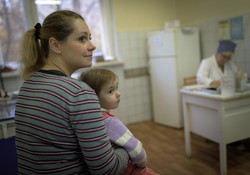Ukraine’s efforts to stop measles outbreak continue as case total increases

WHO/Alex Shpigunov
Measles continues to spread in Ukraine, with new cases now being reported in all oblasts and Kyiv. These cases are the latest in an expanding outbreak that affected over 3000 people and claimed the lives of 5 children and adults in 2017, according to preliminary data. The latest information from other countries in the WHO European Region also indicates a rise in cases, including large measles outbreaks affecting Greece, Italy and Romania.
WHO and partners have been working closely with the affected countries’ health authorities to protect their populations from measles, as well as from other serious vaccine-preventable diseases. “At least twice as many children were vaccinated on time against measles in 2017 compared to in 2016,” says the WHO Representative in Ukraine, Dr Marthe Everard. “This jump in routine immunization coverage represents a great step forward. However, the continuing spread of measles in Ukraine demonstrates that more must be done to vaccinate all those who have fallen behind.” Ukraine has had the lowest immunization coverage in the Region in recent years and therefore has a large population of susceptible individuals.
Progress and challenges in Ukraine
Substantial progress in the past year in Ukraine includes:
- establishment of a national measles task force and a response plan to urgently address the outbreak;
- catch-up campaigns for children up to 10 years old;
- development of a long-term plan to ensure secure supplies of vaccines;
- training for health workers in identifying and reporting measles cases.
Efforts must now be sustained and expanded to address all remaining challenges. It is vital that coverage with supplemental immunization increases, and that health-care workers and all contacts of measles cases, regardless of age, be vaccinated free of charge. Stock-outs at the local level also continue to prevent some eligible children from receiving the vaccines they need. The spread of misinformation about vaccines has made some health workers reluctant to recommend vaccination and some parents hesitant to demand it for their children.
Regional progress toward measles elimination
With fewer than 6000 measles cases reported in 2016 for the entire European Region, and 33 countries having achieved elimination of measles, progress towards regional elimination has been very positive. Large measles outbreaks in some countries in 2017 have, however, brought continued progress into question. Officially reported numbers for the year will be available in February 2018.
“Every child or adult who has not been fully vaccinated is a potential opportunity for measles to take hold and spread. Our joint work to realize the promise of measles elimination is more urgent than ever and it must be sustained,” says Robb Butler, Programme Manager, Vaccine-preventable Diseases and Immunization, WHO/Europe.
About measles
Measles is a highly contagious vaccine-preventable viral disease that is a major cause of childhood mortality globally. Two doses of measles vaccine provide over 99% protection from the disease and is the standard for all national immunization programmes in the Region. Elimination of measles requires 95% coverage with both doses of the vaccine, together with high-quality disease surveillance to quickly detect any cases.



